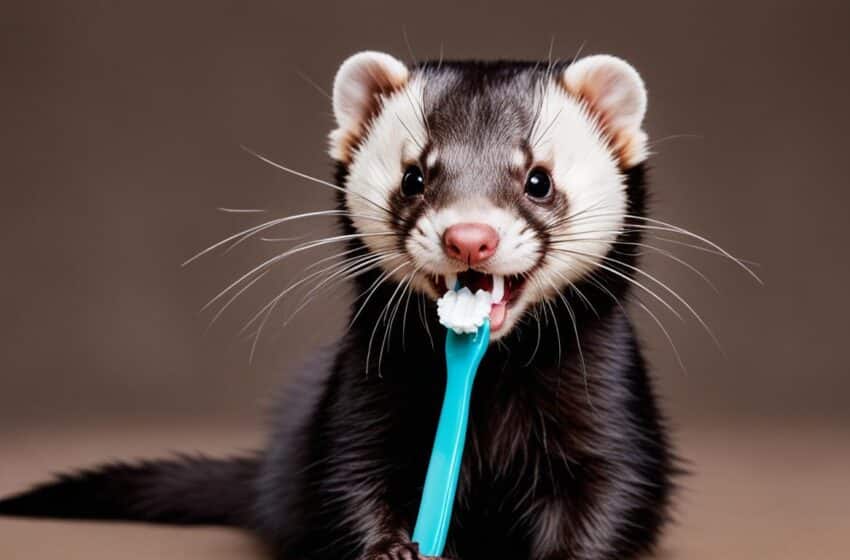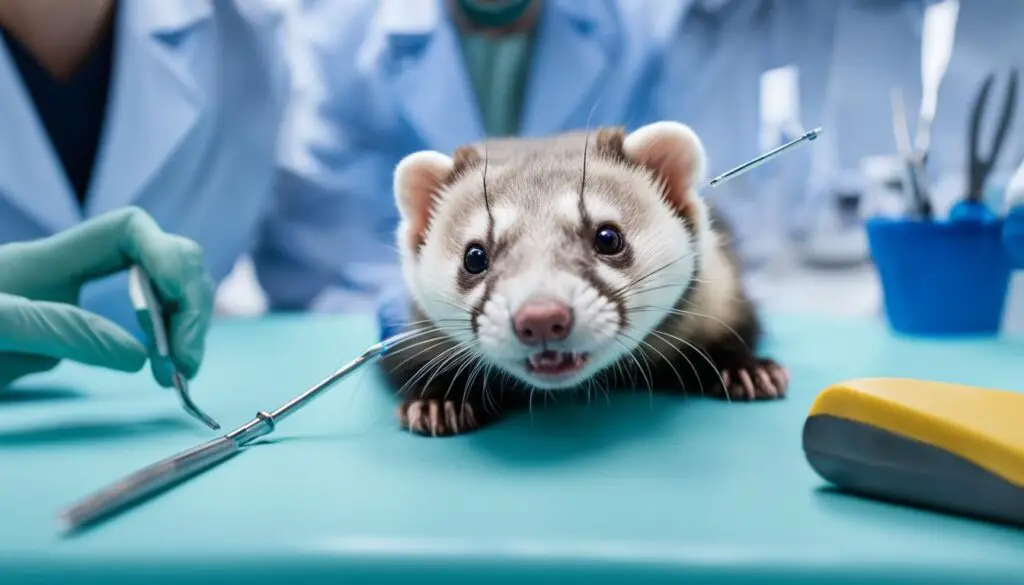Dental Care Tips for Keeping Your Ferret’s Teeth Healthy

As a responsible ferret owner, I understand the importance of maintaining my furry friend’s oral health. Just like humans, ferrets can also experience dental issues if proper care is not provided. That’s why I make sure to implement the right dental care tips to keep my ferret’s teeth healthy and strong.
Ensuring oral health in ferrets is crucial not only for their dental well-being but also for their overall health and quality of life. By following these dental care tips, you can prevent common dental issues that may arise in ferrets.
- Regular dental care is essential for maintaining your ferret’s oral health.
- Ferrets have unique dental anatomy, which requires specific dental care practices.
- Be aware of the signs that indicate potential dental problems in ferrets.
- Establish a dental care routine that includes tooth brushing and dental treats.
- Professional dental cleanings and exams should be part of your ferret’s dental care regimen.
Understanding Ferret Dental Health
Understanding the dental health of ferrets is crucial for providing appropriate care. Ferrets have unique dental anatomy, including long canines and sharp incisors. Dental issues in ferrets, such as dental plaque and tartar buildup, can lead to gum disease and tooth decay. Regular dental cleaning and examination are essential to prevent these problems.
Ferret Dental Anatomy
Ferrets possess specific dental characteristics that require special attention. Their dental anatomy consists of long canines, which help them catch and tear prey, and sharp incisors, which aid in grooming and manipulation of objects. Additionally, ferrets have premolars and molars at the back of their mouth for chewing and grinding food.
Dental Issues in Ferrets
Ferrets are prone to various dental problems that can affect their overall health and well-being. Common dental issues in ferrets include:
- Dental plaque: A sticky film of bacteria that forms on the teeth
- Tartar buildup: Hardened dental plaque that accumulates on the teeth
- Gingivitis: Inflammation of the gums
- Periodontal disease: Severe gum disease that can lead to tooth loss
- Dental abscesses: Infections in the teeth or gums
These dental issues can cause pain, discomfort, and difficulty eating for ferrets if left untreated. It is essential to monitor their dental health closely and take proactive measures to prevent these problems.
Ferret Teeth Cleaning
To maintain proper dental hygiene for your ferret, regular teeth cleaning is necessary. Daily tooth brushing using a soft-bristled toothbrush and ferret-friendly toothpaste is recommended. This practice helps remove plaque and prevent tartar buildup. It’s important to introduce dental cleaning to your ferret gradually and ensure they are comfortable during the process. If your ferret resists tooth brushing, consult with a veterinarian for alternative dental care options.
“Regular dental cleaning and examination are essential to prevent dental issues in ferrets.”
Signs of Dental Problems in Ferrets
As a ferret owner, it’s crucial to be aware of the signs that indicate potential dental problems in your furry friend. Recognizing these symptoms early on can help you take proactive steps to address and treat any issues. Here are some common signs to watch out for:
- Difficulty eating: If you notice your ferret having difficulty when eating, such as struggling to chew or avoiding certain foods, it could be a sign of dental problems. Pain or discomfort in their mouth can make eating a challenging and uncomfortable experience for them.
- Drooling: Excessive drooling in ferrets can be indicative of oral pain or discomfort. If you observe your ferret drooling more than usual or drooling excessively, it’s important to investigate further and consult with a veterinarian.
- Bad breath: Just like humans, ferrets can experience bad breath due to dental issues. Foul-smelling breath can be a result of tooth decay, gum disease, or other oral health problems.
- Weight loss: Dental problems can interfere with a ferret’s ability to eat and cause them to lose weight. If you notice your ferret shedding pounds unexpectedly, it may be due to oral pain that discourages them from eating properly.
- Pawing at the mouth: Ferrets in discomfort may paw at their mouth or face, trying to alleviate the pain they are experiencing. If you observe your ferret engaging in this behavior, it’s crucial to investigate the cause and seek veterinary assistance if necessary.
It’s important to note that these signs can vary in severity, and not all ferrets will exhibit all of them. However, if you notice any of these symptoms in your ferret, it is crucial to seek veterinary assistance promptly. Dental issues can cause oral pain and discomfort, impacting your ferret’s overall health and quality of life. Early detection and treatment are key to ensuring your furry friend’s well-being.

Implementing a Dental Care Routine
Establishing a regular dental care routine is essential for maintaining your ferret’s oral health. By following these practices, you can help prevent dental issues and ensure that your furry friend has a healthy and happy smile.
Tooth Brushing for Ferrets
One of the key components of a dental care routine for ferrets is tooth brushing. It is recommended to brush your ferret’s teeth daily using a soft-bristled toothbrush and ferret-friendly toothpaste. This helps remove plaque and tartar buildup, which can lead to gum disease and tooth decay if left untreated.
When brushing your ferret’s teeth, be gentle but thorough. Start by introducing the toothbrush gradually, allowing your ferret to get used to the sensation. Use small circular motions to brush all surfaces of their teeth. Make sure to reach the back molars, as these areas are often overlooked but prone to dental issues.
Dental Treats for Ferrets
In addition to tooth brushing, dental treats can be a beneficial addition to your ferret’s dental care routine. Dental treats designed specifically for ferrets can help promote dental health by reducing plaque and tartar buildup. These treats often have a crunchy texture that can help scrub away debris and maintain healthy gums.
It is important to choose dental treats that are specifically made for ferrets, as treats for other animals may not provide the same benefits. Always check the ingredients and consult with your veterinarian to ensure that the treats are safe and suitable for your ferret.
A Complete Ferret Dental Care Routine
Implementing a comprehensive dental care routine for your ferret can significantly contribute to their oral health. Here is a suggested routine to follow:
- Brush your ferret’s teeth daily using a soft-bristled toothbrush and ferret-friendly toothpaste.
- Offer dental treats designed specifically for ferrets as an additional measure to promote dental health.
- Regularly schedule dental check-ups with your veterinarian for professional evaluation and cleaning, if necessary.
Remember, each ferret is unique, and their dental care needs may vary. It is always best to consult with your veterinarian for specific recommendations and guidance tailored to your ferret’s individual needs.
Professional Dental Care for Ferrets
While at-home dental care is crucial for your ferret’s oral health, it’s also essential to provide them with professional dental cleanings and exams. These procedures should be performed by a veterinarian experienced in ferret dental care. Veterinary dental care plays a significant role in maintaining your ferret’s teeth and preventing dental issues such as plaque buildup, gum disease, and tooth decay.
During a dental examination, the veterinarian will thoroughly assess your ferret’s teeth and gums, looking for any signs of dental problems. They will also perform necessary cleanings to remove any tartar buildup. This helps prevent oral pain, infections, and other complications that can arise from neglected dental health.
Additionally, the veterinarian will offer guidance on proper dental care practices tailored to your ferret’s individual needs. They may recommend specific dental products, techniques for at-home care, and address any concerns you may have.
Regular dental exams allow for early detection and intervention, improving your ferret’s oral health and contributing to their overall well-being. By partnering with a veterinarian knowledgeable in ferret dental care, you can ensure that your furry friend receives the professional attention they need to maintain healthy teeth and gums.
Remember, prevention is key when it comes to ferret dental health. Invest in their oral care and schedule regular dental check-ups to keep their smiles bright.

| Benefits of Professional Dental Care for Ferrets | How it Helps |
|---|---|
| Early Detection of Dental Issues | Regular dental exams allow for early detection and treatment of dental problems before they escalate. |
| Tartar and Plaque Removal | Professional dental cleanings remove stubborn tartar and plaque buildup that cannot be addressed through at-home care alone. |
| Guidance on Dental Care | Veterinarians experienced in ferret dental care offer valuable guidance and recommendations for maintaining your ferret’s oral health. |
| Prevention of Infections | Thorough dental cleanings help prevent oral infections that can lead to pain, discomfort, and more serious health issues. |
Preventing Dental Issues in Ferrets
Preventing dental issues in ferrets is essential for their overall health and well-being. By following a few key practices, you can help ensure that your ferret maintains good dental hygiene and avoids common dental problems. Here are some important steps to take:
Diet and Dental Health
Feeding your ferret a diet that promotes dental health is crucial. A proper diet can help prevent dental plaque and tartar buildup, which can lead to gum disease and tooth decay. Choose high-quality ferret food that is specifically formulated to promote dental health. Look for options with a balanced blend of nutrients and ingredients that support oral hygiene.
To give your ferret’s teeth an additional cleaning benefit, consider incorporating dental treats into their diet. Dental treats are designed to help scrape away plaque and tartar while satisfying your ferret’s chewing instincts. However, it’s important to choose treats that are safe for ferrets and approved by veterinarians.
Chewing Toys for Dental Health
Providing appropriate chewing toys is another way to maintain your ferret’s dental hygiene. Ferrets have a natural need to chew, and providing them with suitable toys can help satisfy this instinct while promoting good oral health. Look for durable, non-toxic toys that are specifically designed for ferrets. These toys should be made of safe materials that are gentle on your ferret’s teeth and gums.
When selecting chewing toys, opt for options with different textures and shapes. This variety will help stimulate your ferret’s gums and teeth and prevent dental issues. It is also important to regularly inspect the toys for any signs of wear or damage. Replace worn-out toys to avoid any potential harm to your ferret.
Dental Health Monitoring
Regular monitoring of your ferret’s oral health is crucial in preventing dental issues. Take the time to observe your ferret’s behavior and check for any signs of dental problems. Look for symptoms such as difficulty eating, drooling, bad breath, weight loss, or pawing at the mouth. If you notice any of these signs, it’s essential to seek veterinary care promptly. Early detection and intervention can help prevent further complications and ensure your ferret’s dental health.
Scheduling regular veterinary check-ups is also important for monitoring your ferret’s dental health. A veterinarian experienced in ferret dental care can perform thorough examinations and provide guidance on maintaining good oral hygiene. They can identify potential dental issues and recommend appropriate treatments or preventive measures.
By maintaining a proper diet, providing suitable chewing toys, and monitoring your ferret’s dental health, you can help prevent dental issues and support your ferret’s overall well-being. Remember, proactive dental care is key to keeping your ferret’s teeth healthy and strong.
Conclusion
Maintaining your ferret’s oral health is essential for their overall well-being. By implementing proper dental care tips, understanding their dental health, being aware of signs of dental problems, and providing professional and at-home care, you can help prevent common dental issues in ferrets. Regular veterinary check-ups and a proactive approach to dental care will contribute to your ferret’s healthy and happy life.
FAQ
What are some dental care tips for keeping my ferret’s teeth healthy?
To keep your ferret’s teeth healthy, you can implement regular dental cleaning and examination, daily tooth brushing using a soft-bristled toothbrush and ferret-friendly toothpaste, and provide dental treats designed for ferrets. Remember to consult your veterinarian for specific recommendations and guidance.
What should I know about ferret dental health?
Ferrets have unique dental anatomy, including long canines and sharp incisors. Dental issues such as plaque and tartar buildup can lead to gum disease and tooth decay. Regular dental cleaning and examination are crucial for preventing these problems.
What are the signs of dental problems in ferrets?
Common signs of dental issues in ferrets include difficulty eating, drooling, bad breath, weight loss, and pawing at the mouth. If you notice any of these signs, it is important to seek veterinary assistance promptly.
How can I implement a dental care routine for my ferret?
A dental care routine for your ferret may include daily tooth brushing using a soft-bristled toothbrush and ferret-friendly toothpaste. Dental treats designed specifically for ferrets can also be helpful in promoting dental health. Consult your veterinarian for specific recommendations.
Should I seek professional dental care for my ferret?
Yes, it is recommended to seek professional dental cleanings and exams for your ferret. These procedures should be performed by a veterinarian experienced in ferret dental care. During these visits, the vet will thoroughly examine your ferret’s teeth and gums, perform any necessary cleanings, and provide guidance on proper dental care practices.
How can I prevent dental issues in my ferret?
You can prevent dental issues in ferrets by feeding them a diet appropriate for their dental health, providing appropriate chewing toys, and regularly monitoring their oral health. Prompt veterinary care when necessary is also essential in preventing dental issues.



